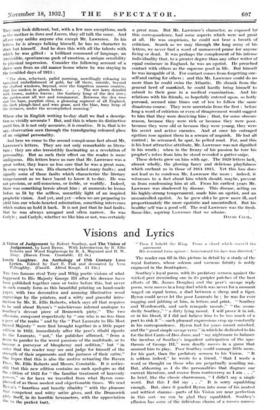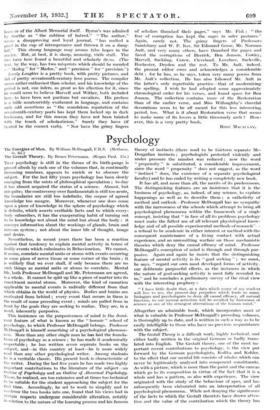Visions and Lyrics
A Vision of Judgement by Robert Southey, and The Vision of Judgement, by Lord Byron. With Introduction by R. Ellis Roberts and Wood Engravings by R. A. Maynard and H. W. Bray. (Raven Press. Constable. £2 5s.) Lovely Laughter. An Anthology of 17th Century Love Lyrics. Edited by Earl E. Fisk and decorated by Vera Willoughby. (Cassell. Alfred Knopf. £1 15s.) THE two famous rival Tory and Whig poetic visions of what happened to His Majesty George III after his decease have been published together once or twice before this, but never in such comely form as this beautiful printing on hand-made
raper, with two decorative and amusing illustrative wood engravings by the printers, and a witty and graceful intro- duction by Mr. R. Ellis Roberts, which says all that requires
to be said about Byron's "mischievous infernal analogue to Southey's devout piece of Brunswick piety." The two effusions, composed respectively by "one who is no less than a peer of the realm" and by the " Poet Laureate to His Most Sacred Majesty" were first brought together in a little paper cdition in 1822, immediately after the peer's ribald riposte to the Laureate, "not," the publisher affirmed, "front a desire to pander to the worst passions of the multitude, or to become a purveyor of blasphemy and sedition," but "in order that the reader may see and judge for himself of the strength of their arguments and the justness of their satire." One hopes that this is also the motive actuating the Raven
Press, Mr. Ellis Roberts and Messrs. Constable. It is notice- able that this new edition contains no such apologies as did the edition of 1822 for "the familiar treatment of heavenly
Powers," so far have we travelled from what Byron com- plained of as those modest and objectionable times. We read 33Yr0n's "heartless and beastly ribaldry" with the pleasure that competent and witty satire .gives, and the Brunswick Piety itself, in its horrible hexameters, with the appreciation due to the perfect -butt.
" Then I beheld the King. From a cloud which eover'd the pavement
His reverend form uprose : heavenward his face was directed."
The reader can fill in this picture in detail by a study of the royal features, whose solemn and vacuous fatuity is nobly engraved in the frontispiece. •
Southey's loyal poem, with its prefatory sermon against the wicked peer (reminding one in its purpler patches of the best efforts of Mr. James Douglas) and the peer's savage reply poem, were moves in a long duel which was never for a moment waged on equal terms, a duel between it *sheep and a tiger. Byron could never let the poor Laureate be ; he was for ever nagging and jabbing at him, in letters and print. "Southey and Wordsworth, and such renegade rascals," "the scoun- drelly Southey," "a dirty lying rascal. I will prove it in ink, or in his blood, if I did not believe hint to be too much of a poet to risk it "—such pleasant expressions crop up constantly in his correspondence. Byron had for years meant mischief, and the" good simple savage verse" in which he dedicated to his foe the first Canto of Don Juan, and" my nightmare to balance the incubus of Southey's impudent anticipation of the apo- theosis of George III," were deadly moves in a game that amused him to play. Poor Southey could manage little more, for his part, than the prefatory sermon to his Vision. "It is seldom indeed," he wrote to a friend, "that I waste it word or thought on those who are perpetually assailing me. But, 'abhorring as I do the personalities that disgrace our current literature, and averse from controversy as I ant. . ." In brief, like the classic charwoman, "I didn't say a single word. But this I did say . . ." It is sorry squabbling enough. But, since it goaded Byron into some of his neatest and wittiest stanzas—parts of his Vision are near perfection in this sort—we can be glad they squabbled. Southey's effusion has some f the ri–dicirlotis charm of a rococo rnauso- leum or of the Albert Memorial itself. Byron's was admired by Goethe as "the sublime of hatred." "The author," wrote a disapproving and loyal journal, "has melted a pearl in the cup of intemperance and thrown it on a dung- hill." This strong language may arouse false hopes in the reader.. But, ,at best, it is sharp, amusing, virile stuff. The two have here found a beautiful and scholarly dress. (The text. by the way, has two misprints which .should be mended Madog " for" Madoc," and " precision " for " precisian.") Lovely Laughter is a pretty book, with pretty pictures, and full of pretty seventeenth-century love poems. The compiler seems rather enthusiast than scholar, and his knowledge of the period is not, one infers, as great as his affection for it, since he would seem to believe Marvel and Wither, both included here, to have been not puritans but cavaliers. His ,preface is a trifle amateurishly exuberant in language, and contains such odd assertions as "the scandalous reputation of the seventeenth-century poets has kept them locked up in dark bookcases, and for this reason they have not been tainted with the touch of scholasticism." Surely they have (if in uted be the correct verb). "Nor have the grimy fingers of scholars thumbed their pages," says Mr. Fisk ; "the fear of corruption has kept the sages in safer pastures." Again, surely not. Tile grimy fingers of Professors Saintsbury and W. P. Ker, Sir Edmund Grosse, Mr. Norman Ault, and very many others, have thumbed the pages and faced the corruptions of Herrick, Ben ;Ionson, Cowley, Marvell, Suckling, Carew, Cleveland, Lovelace, Sackville, Rochester, Dryden and the rest. To Mr. Ault, indeed. the present editor owes and acknowledges a considerable debt ; for he has, as he says, taken very many poems front Mr. Ault's collection. He has also followed Mr. Ault in the latter's only regrettable practice—that of modernizing the spelling. I wish he had adopted some approximately chronological order for his verses, and found space for Ben Jonson. The collection contains more of the Restoration than of the earlier verse, and Miss Willoughby's cheerful decorations seem to be all meant for this less interesting period, too. What is it about Restoration verse that seems to make some of its lovers a little tiresomely arch ? How- ever, this is a very pretty book. • ROSE MACAULAY.

































































 Previous page
Previous page